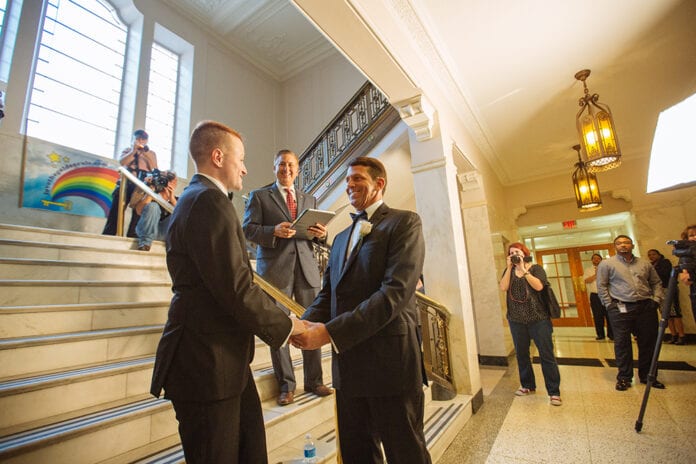
As St. Pete Pride and Come Out St. Pete cofounder Brian Longstreth notes on www.GayStPete.com, “St. Petersburg, Florida, remains the sunniest place to be gay!” Looking around St. Pete’s rainbow accented streets, it’s easy to understand that sunny outlook, but that bright light also can obscure the long road it took to get here as well as the distance still left to reach true equality.
Legislating Love
Legislating so-called “abnormal” intimate relationships in Florida began in 1821, when the territorial government banned acts “tending to debauch the morals of society.” In 1868, the state of Florida strengthened its efforts to criminalize and socially condemn private intimacy by making sexual activity between same-sex partners (as well as certain acts between heterosexuals) a felony. Nearly 90 years later, Florida added a “psychopathic offender” law to the books that allowed authorities to periodically “examine” persons convicted under those laws to determine whether they were still a “menace to others.” In the decade that followed, the infamous Johns Committee (i.e., the Florida Legislative Investigation Committee) used those laws to launch what one journalist termed a “war on privacy, human rights, and fair play” that “ruled lives, destroyed careers, (and) poisoned institutions.”
The Johns Committee
Formed in 1956 to investigate the National Association for the Advancement of Colored People (NAACP) as a means to stymie desegregation efforts, the Johns Committee turned its attention to homosexuality after the committee became mired in legal battles with the NAACP. Lacking legal or social support, the LGTBQ community was vulnerable to the committee’s “casually employed police-state tactics.” Primarily targeting college students, educators, and government employees, the committee publicly harassed, outed, fired and arrested untold numbers of persons for crimes ranging from improper dress (i.e., men wearing “women’s clothing” and vice versa) to “sexual deviation” before it was disbanded in 1965.
Legislating Life
The demise of the Johns Committee did not end official harassment nor did it stop attempts to delegitimize the LGTBQ community. In fact, growing demands for social acceptance and full legal rights (inspired by the Stonewall rebellion of 1969) energized anti-LGTBQ forces. Opponents were no longer satisfied in simply criminalizing private actions; they also sought to prevent access to the rights and norms of everyday life. For example, Florida legislatively banned “homosexual adoption” and samesex marriage in 1977, insisting that “the term ‘marriage’ means only a legal union between one man and one woman.” In 2008, that ban expanded with a constitutional amendment that also barred “civil unions.” LGTBQ opponents also championed efforts to stop the courts from ruling in favor of equality based on existing protective statutes, such as the 1964 Civil Rights Act and the 14th Amendment. For decades, courts ruled that these protections against discrimination did not apply in cases involving a person’s sexual orientation or gender identity.
A New Millennium Brings (Some) Change
Nationally, legal approaches were mixed. In 1993, the outright ban on gay and lesbian persons in the military transitioned into the infamous “Don’t Ask, Don’t Tell” policy before finally being dismissed in 2010. Transgender individuals had to wait until 2016 to openly serve, only to have the ban reinstated in 2019. In 2003, the U.S. Supreme Court reversed its 1986 decision; ruling that laws outlawing same-sex sexual acts were unconstitutional. In 2015, after years of efforts, the Supreme Court ruled in favor of marriage equality, which also allowed for married same-sex couples to legally adopt. And just this June, a Supreme Court decision rendered LGTBQ employment discrimination unconstitutional by including sexual orientation and gender identity as a protected class under the 1964 Civil Rights act. The LGTBQ community still faces significant challenges as laws regarding housing, public accommodations, and services vary widely. Florida lacks statewide protections, but many local municipalities, including St. Petersburg, provide additional nondiscrimination laws.
St. Pete Moves Forward
In the last two decades, St. Petersburg has moved forward with efforts to create a safer place for LGTBQ+ individuals. In 2002, the city added sexual orientation as a protected status to its Human Rights Ordinance (HRO), making it one of a handful of communities in Florida (including Tampa, but not Hillsborough County) prohibiting discrimination in housing, public accommodation, and employment. Somewhat surprisingly to observers, the 6-2 council vote met little vocal opposition even though then-Mayor Rick Baker stood against it. The community since has moved toward wider acceptance, often at odds with statelevel mandates. In 2008, the same year that a constitutional amendment banned same-sex marriage and civil unions, Pinellas County prohibited discrimination based on sexual orientation. In 2012, St. Petersburg adopted a Domestic Partnership Registry that guaranteed many of the same rights traditionally protected by marriage contracts. And in 2013, gender identity protections were added to the city’s HRO. One year before the U.S. Supreme Court made it official, Mayor Rick Kriseman signed the “Mayors for Freedom to Marry Proclamation” supporting marriage equality and the idea that “the sun shines on all who come to live, work, and play.”
The Road Ahead
Despite local protections, a majority of states (including Florida) do not fully protect LGTBQ+ people from discrimination. In many places, LGTBQ+ people can be legally evicted, denied medical treatment, forced into “conversion therapy,” or ejected from restaurants. True equality is still down the road, so the march forward must continue.
Resources available on request; special thanks to Jim Nixon, St. Petersburg’s LGTBQ liaison for his research.

